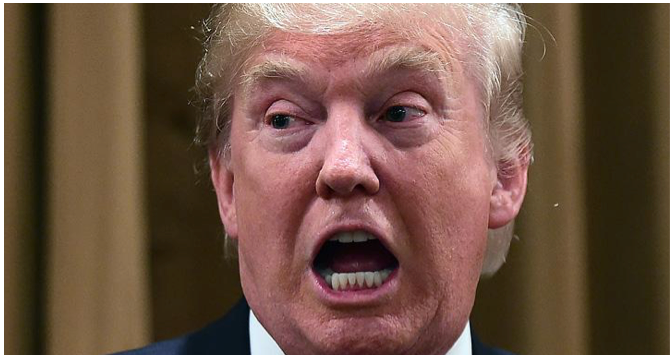CommentsGUEST WORDS--"What should a United States senator, or any citizen, do if the president is a liar?" asks Bernie Sanders.
We face a very serious political problem in this country, and that problem is manifested in a post written yesterday by Amber Phillips of The Washington Post. In her piece, Phillips criticizes me for lowering the state of our political discourse, because I accused the president of being a “liar.”
What should a United States senator, or any citizen, do if the president is a liar? Does ignoring this reality benefit the American people? Do we make a bad situation worse by disrespecting the president of the United States? Or do we have an obligation to say that he is a liar to protect America’s standing in the world and people’s trust in our institutions?
I happen to strongly believe in civil political discourse. The vast majority of people in Congress who hold views different than mine are not liars. It is critical we have strong, fact-based debates on the important issues facing our country and that we respect people who come to different conclusions. In a democracy people will always have honestly held different points of view.
But how does one respond to a president who has complete disregard for reality and who makes assertions heard by billions of people around the world that have no basis in fact?
In her post, Phillips reprints five tweets that I sent out yesterday as examples of “the sorry state of political discourse right now.”
Here they are:
One of my great concerns is that there undoubtedly will be major crises facing the United States and the global community during Trump’s tenure as president. If Trump lies over and over again what kind of credibility will he, or the United States, have when we need to bring countries around the world together to respond to those crises? How many people in our country and other countries will think that Trump is just lying one more time?
Trump said three to five million people voted illegally in the last election. This is a preposterous and dangerous allegation which intentionally opens the floodgates for an increase in voter suppression efforts. Amber Phillips herself previously wrote, “There is just no evidence of voter fraud. Why launch an investigation into something that nearly everyone in U.S. politics — save one notable exception — doesn’t believe warrants an investigation?”
Trump claimed that his victory “was the biggest electoral college win since Ronald Reagan.” Anyone with access to Google could see that this is factually incorrect. George H.W. Bush, Bill Clinton and Barack Obama all had bigger electoral margins of victory than Trump.
And then there are the trivial lies. Trump stated “it looked like a million and a half people” at his inauguration. Who cares? But none of the people who are trained to estimate crowd size believe that one and a half million people attended his inauguration.
More importantly, Trump helped lead a baseless and dangerous attack against the legitimacy of Barack Obama’s presidency by suggesting over and over again that Obama was not born in the United States and therefore not eligible to become president. This was not a disagreement with Obama over policy. It was a deliberate and dishonest effort to appeal to racist sentiment in this country and deny the right of our first African-American president to serve.
Lastly, my tweet which states that the United States will not be respected or taken seriously around the world if Trump continues to shamelessly lie is self-evident. We are the wealthiest, most powerful nation on earth. If we have a president who is not taken seriously by people throughout the world because of his continuous lies, our international standing will clearly suffer.
I find it interesting that Ms. Phillips did not take issue with my facts. Her complaint appears to be that it is improper for a United States senator to state the obvious. And that is that we have a president who either lies intentionally or, even more frighteningly, does not know the difference between lies and truth.
What do you think?
It is easy to know how we respond to a president with whom we disagree on many, many issues. I disagree with Trump’s support for repealing the Affordable Care Act. I disagree with Trump’s plan to give huge tax breaks to billionaires. I disagree with Trump’s appointment of an anti-environmental EPA administrator. I disagree with Trump’s appointments of major Wall Street executives to key economic positions and his plans to loosen regulations on Wall Street designed to protect consumers. And on and on and on! These strong policy disagreements are a normal part of the political process. He has his views. I have mine.
But how do we deal with a president who makes statements that reverberate around our country and the world that are not based on fact or evidence? What is the appropriate way to respond to that? And if the media and political leaders fail to call lies what they are, are they then guilty of misleading the public?
What are your views on this extremely important issue? I look forward to your comments.
(Bernie Sanders (I-Vt.) was elected to the U.S. Senate in 2006 after serving 16 years in the House of Representatives. He is the longest serving independent member of Congress in American history. Elected Mayor of Burlington, Vt., by 10 votes in 1981, he served four terms. Before his 1990 election as Vermont's at-large member in Congress, Sanders lectured at the John F. Kennedy School of Government at Harvard and at Hamilton College in upstate New York. Read more at his website. Follow him on Twitter: @SenSanders or @BernieSanders. This perspective provided CityWatch by Common Dreams.)
-cw
Sidebar
Our mission is to promote and facilitate civic engagement and neighborhood empowerment, and to hold area government and its politicians accountable.

 CityWatch Los Angeles
Politics. Perspective. Participation.
CityWatch Los Angeles
Politics. Perspective. Participation.
24
Tue, Feb














